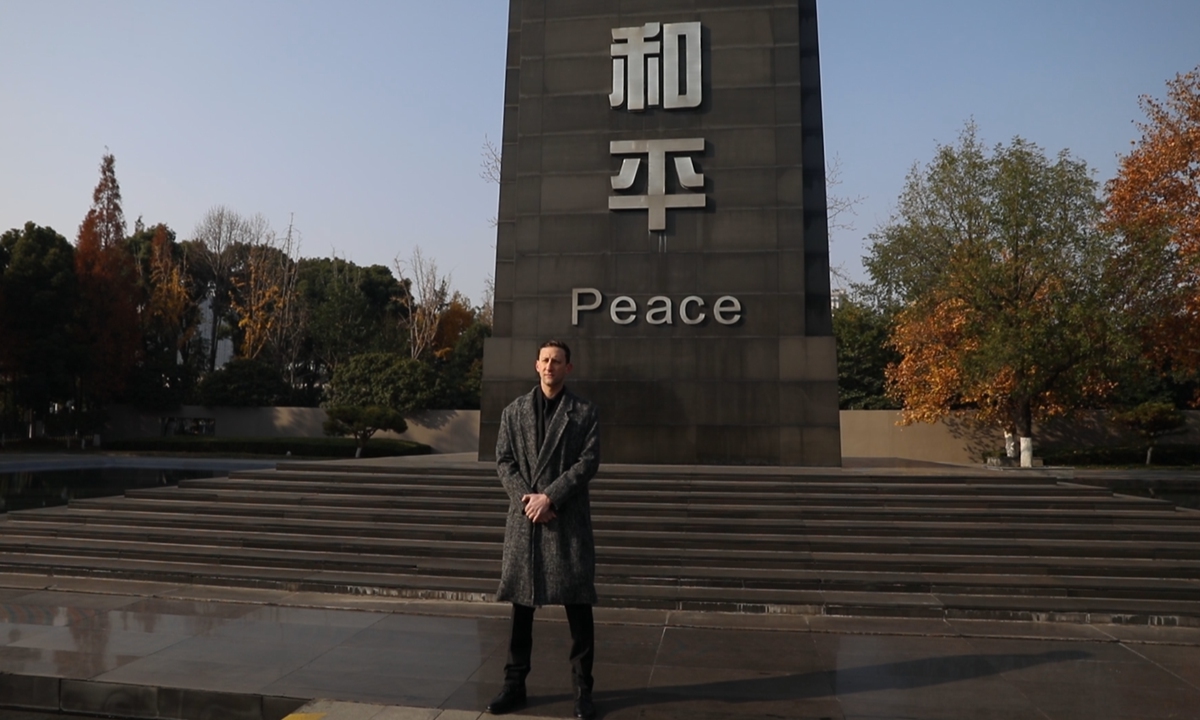
Evan Kail Phot: Courtesy of Evan Kail
Evan Kail, the owner of a US pawnshop who made a name in China by donating a photo album documenting Japanese troops' war crimes in China, is currently touring China, trying to gain a deeper understanding of the country's history and culture. He was particularly moved by his recent visit to the Memorial Hall of the Victims in Nanjing Massacre by Japanese Invaders, he told the Global Times in an exclusive interview.
Kail said he sees China as a "second home" and that he wants to build "a bridge of culture between the United States and China."
Kail, 35, likes sharing his experiences on TikTok. Two years ago, he received the photo album from one of his followers on social media. Then he donated the photo album to China. The album features photos of Japanese atrocities in China during WWII.
Two years after making this donation, Kail decided to embark on a month-long visit to China.
"To read about something horrific that was done and then physically go and see the evidence of what happened to them, they are two completely different things. Even if you think you understand, you don't until you actually see it with your own eyes," Kail told the Global Times.
The Nanjing Massacre was the mass killing of Chinese civilians and unarmed soldiers by the Japanese invaders from December 1937 to January 1938, after Japan seized Nanjing during the War of Resistance against Japanese Aggression (1931-45).
Kail first learned about the history of the Nanjing Massacre in 11th grade and later delved deeper into the subject while pursuing Japanese studies at the University of Minnesota.
However, it was his visit to the Memorial Hall of the Victims in Nanjing Massacre by Japanese Invaders built on a mass burial site that left an indelible mark on him.
"Seeing those bodies as they're lying in the tomb was something I will never forget," Kail recounted, adding that he also visited the Site of the Lijixiang Comfort Station, one of the few comfort stations that have been identified by living survivors of Japan's "comfort women" system.
"Seeing the horrific conditions women were kept in and seeing that with my own eyes was a very powerful experience," Kail told the Global Times.
Kail noted that the survivors of the Nanjing Massacre are dwindling, and he felt fortunate to speak with the granddaughter of one survivor, highlighting the power of personal narratives in understanding history. He chose not to detail more gruesome findings to avoid inciting animosity, but emphasized the awe the experience left him in.
Kail said he plans to continue visiting China with the aim of fostering dialogue and show Westerners a different side of China.
Having been in China for about one month, Kail shared his positive impressions of China, noting the country's advanced infrastructure and technology, which contrasts with Western media portrayals.
"Before I came here, there are some things that I believed that I've come to learn are not true," Kail said, adding that "travel is the best thing that you can do."
"There's a lot of things that I am really delightfully surprised about coming here." Kail said that he was amazed by the high-speed train in China while the so-called "high-speed" train in the State of Minnesota only goes about 140 kilometers an hour, which is one-third of the speed of the trains in China.
Kail also appreciates the Chinese people's hospitality and the country's food, and has developed a fondness for Chinese tea culture and historical sites.
He recalled visiting the Temple of Heaven during his trip in Beijing and taking part in a ritual.
"You cross the street to the rental shop, dress up in traditional attire, and then, with the mind-set of being at the center of the universe where visitors make wishes, you make your wishes. That was quite an enjoyable experience," he said.
Kail said he plans to make China his "second home" by continuing to visit and create content that he believes promotes peace. "I will be returning for the Lunar New Year and expect to be here for at least six weeks," Kail told the Global Times, considering a 6-week rotation between China and the US.
"I'm trying to build a bridge of culture between the United States and China," he said.




